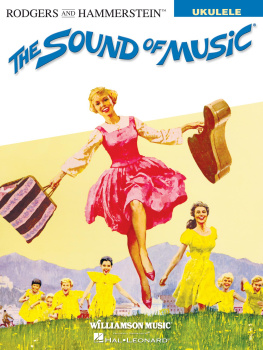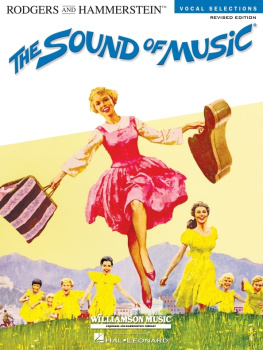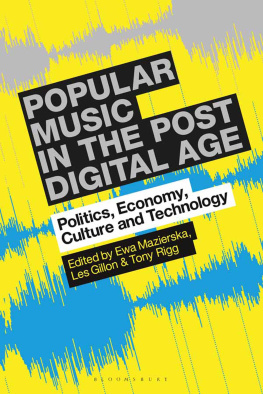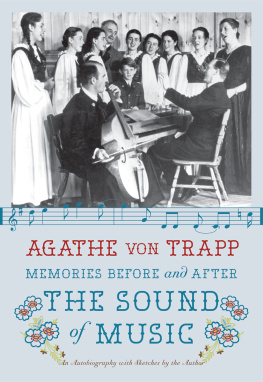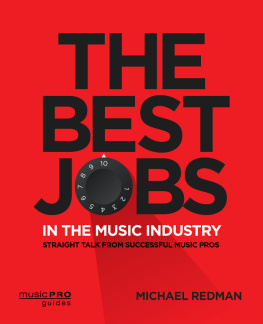THE POLITICS OF POST-9/11 MUSIC:
SOUND, TRAUMA, AND THE MUSIC INDUSTRY IN THE TIME OF TERROR
The Politics of Post-9/11 Music:
Sound, Trauma, and The Music Industry in the Time of Terror
JOSEPH P. FISHER
The George Washington University, USA
and
BRIAN FLOTA
Oklahoma State University, USA
First published 2011 by Ashgate Publishing
Published 2016 by Routledge
2 Park Square, Milton Park, Abingdon, Oxon OX14 4RN
711 Third Avenue, New York, NY 10017, USA
Routledge is an imprint of the Taylor & Francis Group, an informa business
Copyright Joseph P. Fisher and Brian Flota and the contributors 2011
Joseph P. Fisher and Brian Flota have asserted their right under the Copyright, Designs and Patents Act, 1988, to be identified as the editors of this work.
All rights reserved. No part of this book may be reprinted or reproduced or utilised in any form or by any electronic, mechanical, or other means, now known or hereafter invented, including photocopying and recording, or in any information storage or retrieval system, without permission in writing from the publishers.
Notices:
Product or corporate names may be trademarks or registered trademarks, and are used only for identification and explanation without intent to infringe.
British Library Cataloguing in Publication Data
The politics of post-9/11 music : sound, trauma, and the music industry in the time of terror. (Ashgate popular and folk music series)
1. Popular music 20012010 History and criticism. 2. Music Social aspects United States History 21st century. 3. September 11 Terrorist Attacks, 2001 Influence.
I. Series II. Fisher, Joseph P. III. Flota, Brian.
306.4842097309051dc22
Library of Congress Cataloging-in-Publication Data
The politics of post-9/11 music : sound, trauma, and the music industry in the time of terror / [edited by] Joseph P. Fisher and Brian Flota.
p. cm. (Ashgate popular and folk music series)
Includes index.
ISBN 978-1-4094-2784-1 (hardcover : alk. paper)
1. Popular musicUnited StatesPolitical aspects. 2. September 11 Terrorist Attacks, 2001Songs and musicHistory and criticism. 3. War on Terrorism, 20012009Songs and musicHistory and criticism. I. Fisher, Joseph P. II. Flota, Brian.
ML3918.P67P655 2011
781.64097309051dc23
2011021370
ISBN 9781409427841 (hbk)
Contents
Joseph P. Fisher and Brian Flota
Samuel Dwinell
Benjamin J. Robertson
Craig Eley
Conrad Amenta
Isaac Vayo
Rob Wallace
Katheryn Wright
Aisha Staggers
Jeffrey Roessner
Matthew Siblo
S. Todd Atchison
Molly Brost
Gerrit Roessler
Steve Waksman
General Editors Preface
The upheaval that occurred in musicology during the last two decades of the twentieth century has created a new urgency for the study of popular music alongside the development of new critical and theoretical models. A relativistic outlook has replaced the universal perspective of modernism (the international ambitions of the 12-note style); the grand narrative of the evolution and dissolution of tonality has been challenged, and emphasis has shifted to cultural context, reception and subject position. Together, these have conspired to eat away at the status of canonical composers and categories of high and low in music. A need has arisen, also, to recognize and address the emergence of crossovers, mixed and new genres, to engage in debates concerning the vexed problem of what constitutes authenticity in music and to offer a critique of musical practice as the product of free, individual expression.
Popular musicology is now a vital and exciting area of scholarship, and the Ashgate Popular and Folk Music Series presents some of the best research in the field. Authors are concerned with locating musical practices, values and meanings in cultural context, and draw upon methodologies and theories developed in cultural studies, semiotics, poststructuralism, psychology and sociology. The series focuses on popular musics of the twentieth and twenty-first centuries. It is designed to embrace the worlds popular musics from Acid Jazz to Zydeco, whether high tech or low tech, commercial or non-commercial, contemporary or traditional.
Professor Derek B. Scott
Professor of Critical Musicology
University of Leeds
Notes on Contributors
Conrad Amenta: Writer; Cokemachineglow.com
S. Todd Atchison: University of North Carolina at Greensboro
Molly Brost: University of Southern Indiana
Samuel Dwinell: Ph.D. candidate; Cornell University
Craig Eley: Ph.D. candidate, American Studies; University of Iowa
Ryan Randall: Ph.D. candidate, Visual and Cultural Studies; University of Rochester
Benjamin J. Robertson: Instructor, Department of English; University of Colorado, Boulder
Gerrit K. Roessler: University of Virginia
Jeffrey Roessner: Mercyhurst College
Matthew Siblo: Ed.M.; Ph.D. Candidate in Counseling; The George Washington University
Aisha Staggers: Assistant Director, Center for Public Policy & Social Research; Central Connecticut State University
Lloyd Isaac Vayo: Defiance College
Dr. Rob Wallace: Research Associate; Improvisation, Community, and Social Practice; University of Guelph
Steve Waksman: Associate Professor, Music and American Studies; Smith College
Katheryn Wright: Florida State University
Foreword
The Earth Still Is Not a Cold Dead Place: A Conversation with Chris Hrasky
In late August 2001, the instrumental rock band Explosions in the Sky released their second record Those Who Tell the Truth Shall Die, Those Who Tell the Truth Shall Live Forever. The albums cover art depicted an angel flying above a group of soldiers in silhouette, a plane flying in the distance. Ominously, the declaration This plane will crash tomorrow was inscribed on the inside of the sleeve. Roughly two weeks after the albums release, the events of September 11, 2001 unfolded to the worlds horror.
The uncanny, almost unthinkable, coincidence set off a barrage of speculation about the groups prescience. Did they know? How could they know? Are they joking? Were they involved? Indeed, the bands bassist, Michael James, was deemed a threat to security and was detained in an Amsterdam airport when authorities discovered that he had the words this plane will crash tomorrow written on his guitar (Chamy).
Two years later, the band released what many critics have seen as their masterwork: the gorgeous The Earth Is Not a Cold Dead Place. More restrained than its exceedingly loud predecessor, Earth journeys through passages of deep melancholy on its way toward a triumphant conclusion in its final track the soothing, reassuring Your Hand in Mine. Writing for




